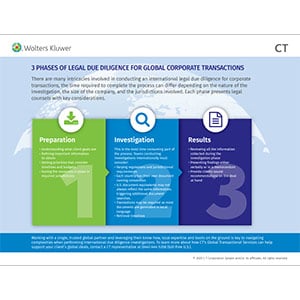Operating globally has far-reaching implications for any company. Whether the company is undertaking a merger, acquisition, carving out or spinning off a business, its legal counsel will need to perform due diligence work to reveal potential legal liabilities.
However, international due diligence introduces new complexities for law firms, legal counsels, and their teams. Attorneys for companies that transact business internationally need to be cognizant of different jurisdictional requirements, laws and regulations that require special consideration when pursuing a transaction. Failing to conduct timely and sufficient due diligence can also result in enforcement actions by local government authorities.
In this article, we’ll explore the three stages of conducting an international legal due diligence and key actions that legal teams must undertake for their clients’ global transactions.
Phase 1: Preparation
The first phase in a due diligence process is preparation. During this time, it’s important for legal teams to understand what their clients are seeking to accomplish with the transaction. Depending on the deal, attorneys must assess what their clients’ end goals for the transaction are. Based on these conversations, attorneys define what information is most important to obtain, and set priorities for the following phase of the process considering timelines and budgets.
When it is an international transaction, the right resources need to be put in place to perform the due diligence in the required jurisdiction. This can be challenging for most legal teams due to limited time and resources. Leaning on an expert provider that has the know-how and boots on the ground internationally ensures that investigations are conducted efficiently and in a timely manner.








